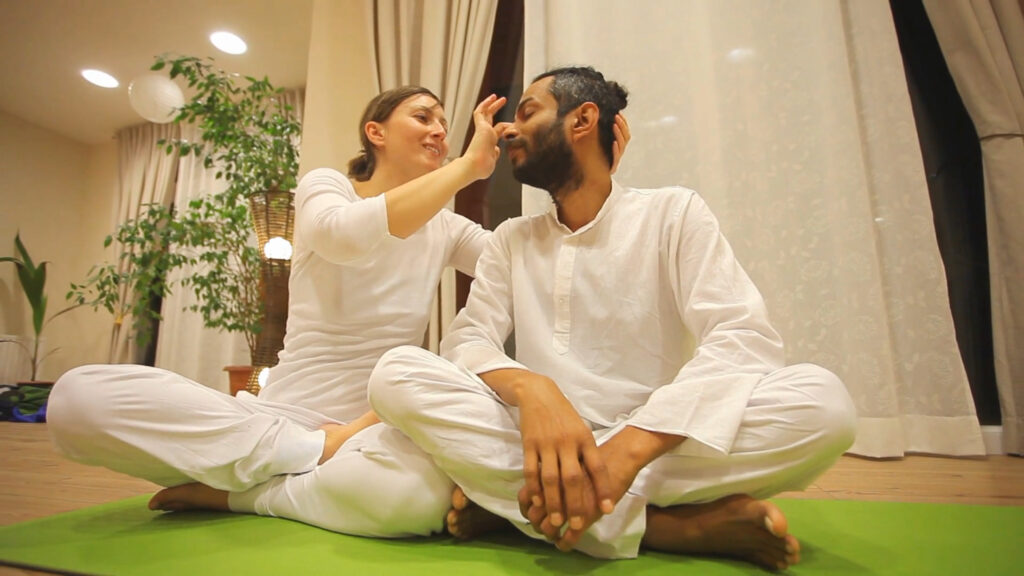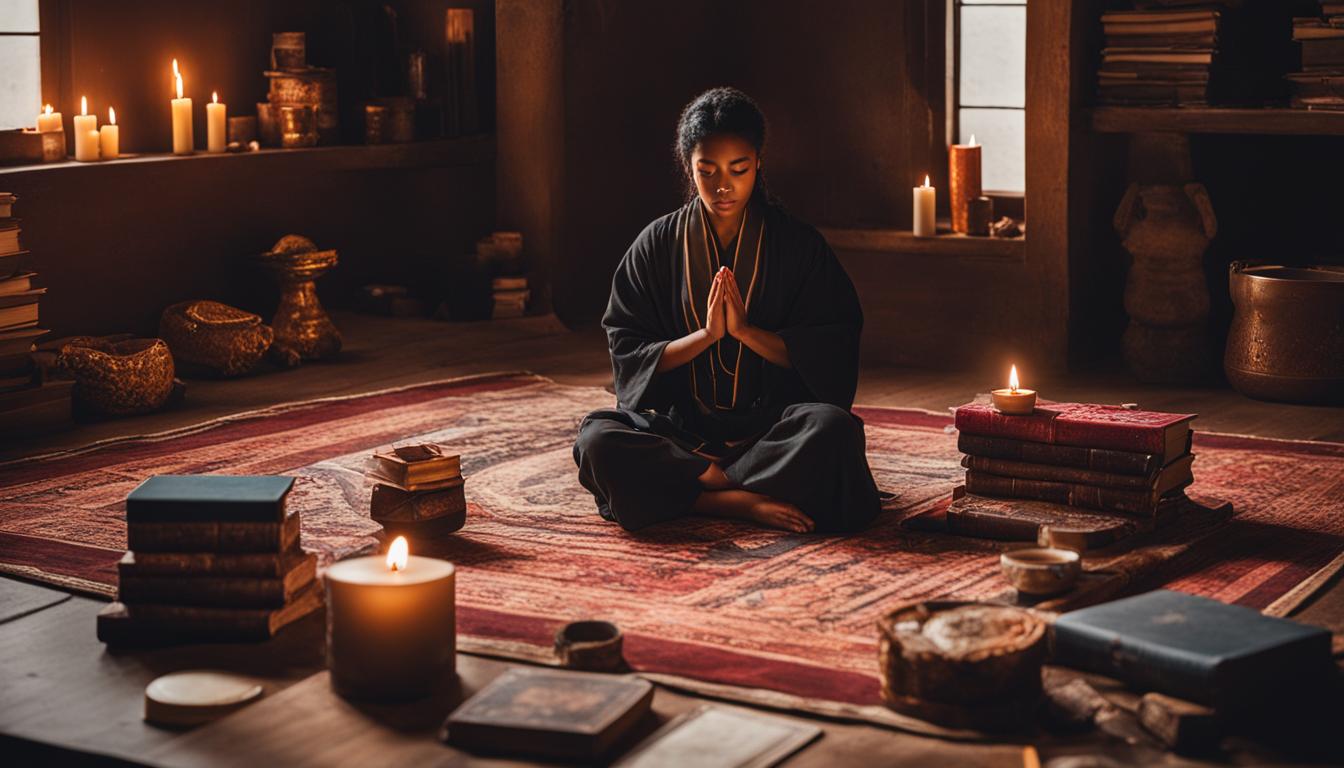As I delve into the complexities surrounding the topic of celibacy, several questions frequently come to mind—mainly, does celibacy include self pleasure? It’s a subject that bridges personal beliefs, philosophical underpinnings, and spiritual doctrines. Reflecting deeply on celibacy and masturbation unveils a spectrum of interpretations, from strict abstinence to a nuanced understanding that aligns with the individual’s purpose for choosing celibacy.
The intersection of self-pleasure in relation to celibacy is wrought with varied perspectives. As someone immersed in exploring this domain, I’ve come to realize that the inquiry can celibacy involve self-pleasure is not one that yields a universal answer. Ultimately, understanding celibacy and self-pleasure hinges on personal guidelines and the intentions outlined in one’s celibate lifestyle.
Key Takeaways
- Celibacy often surpasses its simple definition and may involve intricate personal ethics regarding self-pleasure.
- Self-mastery and the intentions behind one’s celibacy play crucial roles in whether masturbation aligns with their practice.
- The contemplation of can be celibate and self-pleasure is deeply subjective and varies across ethical and spiritual spectrums.
- Exploring historical and cultural contexts provides broader insights into different interpretations of celibacy.
- A profound understanding of the self is integral to navigating the choices around celibacy and self-pleasure.
- Each individual’s journey is unique, with personal boundaries and spiritual objectives shaping their view on the matter.
Understanding Celibacy: A Comprehensive Overview
Often misconstrued in modern discourse, celibacy encompasses more than just a vow of sexual abstinence; it is a multifaceted practice with deep historical roots and spiritual significance. From my explorations and study, I’ve come to find that while some may ask what is allowed during celibacy, the answer is not a simple one-size-fits-all, as cultural and individual interpretations define the boundaries of this personal journey.
Definitions and Historical Context
Celibacy, traditionally understood, refers to the abstention from marriage and sexual relations. Spiritual leaders and historical figures, including the likes of Pope John Paul II and Swami Chidananda Saraswati, have shaped our understanding of celibacy, offering rich traditions that intertwine celibacy and spirituality. Examining the roots of this practice reveals its integral role in cultivating mental health and fortifying ethical principles.
The Various Forms of Celibacy
As a journalist delving into the various layers of this topic, I’ve uncovered that celibacy is not a monolith but varies in form. Some individuals commit to complete sexual abstinence, while others may choose to forego marriage but not necessarily all sexual activity. In exploring self-pleasure within celibacy, questions arise regarding its alignment with the principle’s core values of self-mastery and restraint.
Celibacy and Its Significance Across Different Cultures
Across different cultures, celibacy is revered not just for its physical implications but for its mental and spiritual benefits too. Delving into celibacy benefits and its impact on mental health, I have noticed that many associate it with greater concentration and emotional equanimity, which can be attributed to the practice’s demands for high discipline and control over one’s impulses. Furthermore, celibacy is often practised within spiritual traditions to attain a heightened sense of connection with the divine, prevalent in Hinduism, Buddhism, and Christianity.
In my journey to dissect and comprehend the essence of celibacy, I continue to engage with its complexities — acknowledging that what is allowed during celibacy, its mental health consequences and spiritual richness can only be fully appreciated through a broadened perspective of this ancient and varied practice.
Exploring Self-Pleasure Within Celibacy
The concept of celibacy often invokes images of unwavering self-discipline and a life free from the clutches of carnal pleasures. It’s a commitment that comes with the decision to forego sexual activities for personal or spiritual reasons. Yet, my curiosity leads me to probe the nuances of self-pleasure and the concept of celibacy. Is it feasible to harmonize the act of self-pleasure with the traditionally restrictive nature of celibacy?
I find myself reflecting on the teachings of spiritual luminaries such as Swami Vivekananda, who uphold a life of strict abstinence for higher spiritual attainment. Does engaging in self pleasure resonate with the objectives of mental fortitude and spiritual purity they espoused? This contemplation invariably leads to the pertinent question, can you be celibate and self pleasure?
Could it be that the pursuit of self-pleasure, in the context of celibacy, doesn’t necessarily negate the essence of the practice but rather depends on an individual’s personal spiritual or ethical framework?
This poses the great debate of celibacy vs self pleasure. Some might argue that the journey towards self-realization isn’t hindered by self-pleasure if it’s approached with the right mindset and doesn’t become the focal point of one’s existence. Here, I present a comparative analysis to navigate this profound inquiry.
| Perspective | View on Self Pleasure | View on Celibacy |
|---|---|---|
| Traditional Spiritual | Avoided as it’s viewed as a physical indulgence | Essential for spiritual growth and higher consciousness |
| Modern Interpretative | Seen as a natural act that can be part of self-care | Considered a personal choice with flexible boundaries |
| Philosophical | Discouraged if it distracts from the pursuit of wisdom | Valued for its role in fostering discipline and focus |

In my journey to unravel these perspectives, I am reminded that the relationship between self-pleasure and the concept of celibacy is subject to my interpretation. It seems that the essence of celibacy might extend beyond a mere checklist of physical abstentions to include a broader spectrum of self-awareness and personal growth. One can’t help but ponder on the individual sovereignty over one’s body and choice – a quest that remains open-ended and deeply personal.
Celibacy and Masturbation: Ethical and Philosophical Perspectives
The discourse surrounding celibacy and its implications on individual health, spirituality, and religious practices ebbs and flows with nuanced arguments and passionately divergent viewpoints. Within this debate, the consideration of masturbation raises compelling questions about the practice’s ethical alignment with the traditional vows of celibacy. I will explore the multifaceted perspectives that shape current understanding while reflecting on historical philosophical insights.
Sexual Abstinence vs. Self-Pleasure: The Debate
Questions about celibacy often lead to discussions on whether activities such as masturbation find a place within its bounds. The arguments are as variegated as the colors of the human experience, with some emphasizing the inherent benefits of celibacy for health and others tackling the intricate overlap between celibacy and spiritual practice. Is the intended discipline of celibacy confined solely to the realms of physical interaction, or does it extend into the privacy of one’s personal experiences?
Interpreting the Teachings of Influential Philosophers and Spiritual Leaders
Examining the stances of figures like Leo Tolstoy and spiritual guides including Swami Vivekananda renders a spectrum of interpretations. Tolstoy’s advocacy for non-violence and asceticism grappled with the human condition, while Vivekananda’s emphasis on spiritual education and character pointed to the transcendence of physical urges for higher enlightenment. These diverse teachings infuse the debate with rich, historical context and enduring relevance.
The Role of Intention in Celibacy and Self-Pleasure Practices
Celibacy is more than a practice; it is a spiritual endeavor that beckons the alignment of one’s intentions with the quest for inner purity and self-mastery.
In the personal journeys within celibacy, intentionality plays a decisive role. It invites a deep introspection into whether actions support the overarching objective of personal growth and connection to a higher spiritual or religious ideal. Assessing the alignment between the motivations behind self-pleasure and the principles of celibacy offers a transformative lens through which individuals understand and navigate their choices.
| Aspect of Celibacy | Health Benefits | Spiritual and Religious Significance |
|---|---|---|
| Self-Discipline | Improved mental focus, reduced anxiety | Fosters spiritual clarity and strength |
| Physical Abstinence | Possible reduction in sexually transmitted infections (STIs) | Consecration of bodily energies to spiritual or religious purposes |
| Self-Pleasure Practices | Relief from stress, potential health benefits linked to orgasm | Varies depending on philosophical or theological perspective |
As I penetrate deeper into this intricate subject, the insights drawn reflect a narrative as old as time—balancing human nature’s desires with the aspirational aims of religious and spiritual pursuits. Celibacy benefits encompass various dimensions of existence, encouraging a holistic gaze upon its practice both in solitude and within the collective sphere of human religious endeavors.
The Question of Self-Control: Does Celibacy Include Sexual Abstinence Only?
In examining the broad spectrum of celibacy, a recurring theme is its inherent link to self-discipline and self-control. As someone who has delved into the intricacies of this practice, I find the perspective adopted by thinkers like H.P. Blavatsky of notable significance. They postulate that true celibacy isn’t merely a physical abstention from sexual activity but a more profound dedication to purity—of both mind and spirit.
This commitment to purity transcends the mere avoidance of physical acts—it envelops a more holistic abstention.

An often-asked question by those interested in the celibate path, perhaps reflecting upon their own journeys or contemplating the roads ahead, is what to avoid in celibacy. It’s widely acknowledged that discipline played a pivotal role in the lives of historical figures such as Leonardo da Vinci, who sought after the conservation of their vital energies. This narrative strongly suggests the evasion of not just actions, but also certain thoughts and desires that might deter one from personal and spiritual objectives.
Indeed, the ethos of celibacy encompasses a broad pillar—self-restraint—which can manifest in ways that aren’t always obvious. It demands a meticulous introspection into what might lure one away from their chosen path. This is where celibacy and self-discipline intertwine, reinforcing the notion that the journey is not solely about forsaking physical pleasures but about fortifying the fortress of one’s resolve to reach higher spiritual and emotional echelons.
- Understanding the broader implications of self-control in the context of celibacy
- Identifying non-physical aspects that may need attention to uphold the celibate vow
- Recognizing the power of intention and focus in maintaining self-discipline
It’s pertinent for me to clarify that celibacy extends beyond the exclusion of sexual intercourse. It invites the celibate to vigilantly guard against any form of indulgence that could potentially compromise their spiritual growth. In my assessment, the true challenge and beauty of celibacy lie in the myriad moments where one exercises what to avoid and how to reflect upon the profound depths of their internal resolve.
Physical Health Impacts: What Happens to the Body During Celibacy?
When we address the subject of celibacy, an often-debated aspect is its impact on physical health. The choice of a celibate life, free from sexual encounters, could bring about significant transformations within our body—a subject I find utterly fascinating.
Understanding Bodily Changes in Absence of Sexual Activity
My curiosity piqued concerning the changes one might expect during celibacy, I delved into understanding the physiological reactions that occur when the body does not engage in sexual activities. It would seem that a domino effect begins with hormonal fluctuations—testosterone and estrogen levels, for instance, might stabilize or vary, affecting mood and energy levels.
I have observed in historical accounts and current testimonies, some individuals report a surge of vitality and mental concentration that they attribute to their celibate status.
Celibacy Benefits and Potential Health Concerns
Typecasting celibacy as purely beneficial, however, would be an oversight. Science whispers about links between prolonged abstinence and certain health benefits such as a degree of protection against STIs and potential reduction in prostate cancer risk. Nonetheless, health concerns also manifest; the lack of sexual activity sometimes may lead to anxiety or stress due to a sudden shift in one’s lifestyle.
This is why I believe it’s crucial we approach the topic of celibacy from a holistic standpoint—acknowledging both the benefits and potential health concerns that might arise.
Some argue that celibacy and happiness are intertwined, suggesting that abstaining from sexual activity can lead to a contented and healthy emotional state. While the jury is still out on this insight, I’ve come to realize that personal experience with celibacy can vary widely, and each person’s journey is uniquely their own.
Self-Pleasure and Celibacy: Navigating Emotions and Desires
In my exploration of the delicate balance between celibacy and intimacy, I’ve come to understand that it transcends mere physical abstinence, guiding one towards richer emotional and spiritual experiences. This path is navigated with a deep sense of celibacy and self-care, as it involves tuning into emotional wellness and fostering practices that honor the commitment to celibacy.
Emotional self-sufficiency is not discovered overnight; rather, it is a journey that calls for patience and kindness towards oneself.

Devotion to celibacy and self-love can manifest in many ways, from the simple act of taking time for self-reflection to engaging in fulfilling activities that bring joy and foster personal growth. One vital aspect that I advocate is the practice of mental and emotional hygiene, just as one would care for their physical body, ensuring that the mind and heart remain nourished and respected.
It’s important to acknowledge that the draw towards intimacy is an intrinsic human trait. A compassionate approach involves balancing one’s own needs for closeness with the commitment to celibacy, employing strategies that maintain celibacy and self-respect without suppressing the inherent yearning for connection.
These strategies might include cultivating platonic relationships that offer emotional fulfillment, or engaging in self-expressive activities like art or writing, to channel intimacy into creative energy.
Choosing celibacy doesn’t mean neglecting the need for love and respect; it’s about redefining those needs and how they are fulfilled beyond physical expression.
I am often asked how one can nurture these aspects of self-care, self-love, and self-respect while on this path. I answer by emphasizing the importance of setting boundaries, practicing mindfulness, and finding joy in solitude as ways to not only survive but thrive in a celibate life.
- Mindfulness meditation to remain inwardly aligned
- Journaling to process and understand emotions
- Physical exercise to maintain a healthy relationship with the body
- Educational pursuits to broaden the mind and spirit
Celibacy in Relationships: How Couples Manage Intimacy and Boundaries
Managing the intricate balance between intimacy and the choice of celibacy in relationships is an introspective journey that many couples embark upon. The journey is not exclusively a personal endeavor but a cooperative venture that necessitates the understanding and commitment of both partners.
By analyzing the experiences of historical figures and modern-day couples, significant insights emerge into how intimacy finds expression beyond physicality within the commitments of celibacy and marriage.
Celibacy and Marriage: Case Studies and Reflections
In examining the relationship between , we often look to prominent individuals from history who have grappled with this balance. Tolstoy’s writings reflect on the complexity of sustaining a marital connection rooted in intellectual and emotional communion, free from the dimensions of physical intimacy. Through these reflections, a picture develops of a bond that is cultivated through shared values, aspirations, and deep mutual respect.

Maintaining Intimacy Without Sexual Interaction
The pivotal aspect of maintaining intimacy without sexual interaction lies in the ability of partners to forge deep emotional and spiritual ties. Couples practicing celibacy often create a rich tapestry of shared experiences that engage their intellectual and creative passions, thereby nurturing a bond that goes beyond the physical dimension. Open communication, mutual understanding, and empathy become the cornerstones of such relationships, offering a unique depth of connection.
This realm of celibacy and intimacy underscores the multifaceted nature of love, revealing that at the heart of relationships, the most profound form of intimacy is one that is emotionally and spiritually charged.
In closing, while the choice of celibacy within a relationship may present unique challenges, there is an overwhelming potential for couples to discover enriching and fulfilling means of maintaining intimacy. The foundational elements of trust, communication, and shared pursuit of growth allow couples to uphold their boundaries while nurturing a lasting connection.
Religious and Spiritual Dimensions of Celibacy
In my exploration of celibacy, I’ve discovered its profound significance across religious and spiritual contexts. This ancient practice is more than a mere abstention from physical intimacy; it’s a conscious choice to sharpen one’s self-awareness and forge a deeper connection with the divine. Religions like Hinduism, Christianity, and Buddhism hold celibacy in high regard, not merely as a vow but as a crucial aspect of spiritual growth and devout practice.
Celibacy and Religion: From Vows to Practice
My immersion into the lives of those who have committed to religious vows of celibacy reveals an intricate blend of discipline and devotion. The practice is not merely about forgoing sexual relations but encompasses a holistic approach that encompasses celibacy and self-growth. These vows are a testament to their dedication to a life in service of spiritual aspirations, embodying purity and self-mastery. Moreover, this disciplined adherence maximizes one’s potential for self-realization and transformative inner peace.
Celibacy and Spirituality: Insights from Monastic Lives
The wisdom gleaned from monks and nuns who embrace celibacy speaks volumes about the essential role celibacy plays in the pursuit of enlightenment. Through my encounters with these spiritual figures, I’ve uncovered that celibacy fosters an environment conducive to profound self-transformation. It is a deliberate act of renouncing worldly pleasures to gain untold spiritual rewards.
Those leading monastic lives openly share their journeys of self-transcendence, encompassing the full spectrum from battling temptation to achieving a state of elevated consciousness, illuminating the path to true self-awareness.
FAQ
Does celibacy include self pleasure?
Celibacy traditionally involves abstaining from sexual intimacy, which can include self pleasure. However, the interpretation of whether self pleasure is permitted varies among individuals and their personal definitions or religious/spiritual beliefs regarding celibacy.
What is allowed during celibacy?
During celibacy, individuals commonly abstain from sexual intercourse and marriage. What else is allowed can depend on personal goals and the specific intentions behind one’s commitment to celibacy.
Can celibacy involve self pleasure?
Celibacy can involve self pleasure if an individual’s personal guidelines for their celibate practice permit it. Some may argue that celibacy’s purpose is self-mastery, which self pleasure could contradict, whilst others might find it inconsequential to their celibate intentions.
What are the various forms of celibacy?
Forms of celibacy can range from complete sexual abstinence, including self pleasure, to abstaining from marriage and partnerships, to temporary periods of sexual abstinence for spiritual or religious reasons.
How does celibacy affect mental health and spirituality?
Celibacy can have a positive impact on mental health and spirituality by fostering self-discipline, focus, and inner peace. It is often used as a tool for personal growth, reflection, and deepening spiritual connections.
What happens to the body during celibacy?
During celibacy, the body may experience hormonal and neurological changes. Some individuals report increased energy and mental clarity, while others might need to manage potential health concerns related to prolonged sexual abstinence.
Can you be celibate and still engage in self pleasure?
Yes, some individuals consider themselves celibate while still engaging in self pleasure, depending on their personal beliefs and the intentions behind their celibacy practice.
How do couples manage intimacy and boundaries when practicing celibacy?
Couples practicing celibacy often work on strengthening emotional, intellectual, and spiritual connections, relying on deep communication, mutual understanding, and shared values to maintain intimacy while respecting celibate boundaries.
How is celibacy practiced in religious contexts?
In religious contexts, celibacy is practiced as a vow of abstinence from sexual relations, often part of a commitment to spiritual development and closer connection to the divine. Each religion has its own specific guidelines and practices surrounding celibacy.
Is masturbation considered a violation of celibacy?
Opinions differ on whether masturbation is a violation of celibacy. Some argue it contradicts the self-restraint celibacy embodies, while others believe it does not impact the spiritual or personal growth celibacy aims for.
Source Links
- https://selfdefinition.org/celibacy/quotes/richard-rose-temptation.htm
- https://davidpratt.info/sex.htm#s7
- https://selfdefinition.org/celibacy/chidananda/celibacy-part-4.htm




